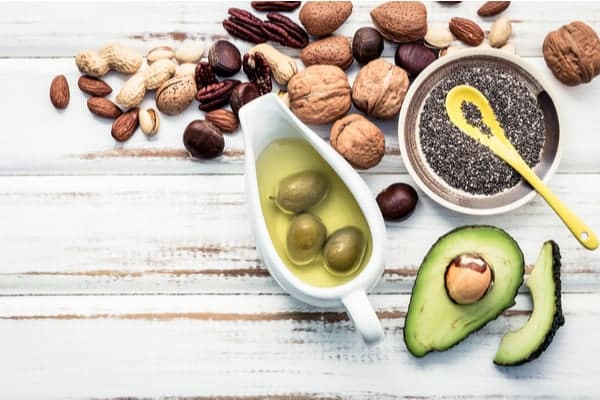Did you know that the human body is made up of approximately 60% water?
Water is crucial for healthy digestion, proper breathing, and just about every basic function. When you don’t have proper fluid levels, dehydration can occur which can lead to various less than favorable side effects.
Unfortunately, more than 70% of Americans may suffer from chronic dehydration, according to doctors. And because it can come in the form of several different symptoms, many people fail to notice that they’re dehydrated.
In this article, you’ll discover 8 tell-tale signs that you’re dehydrated and the best ways to ensure you maintain proper fluid levels.
What is Dehydration?
Your body needs adequate water intake for every function it performs. Dehydration can be mild, moderate, severe, or chronic depending on how much fluid your body’s missing.
Dehydration is your body’s negative reaction to having a water deficiency.
Chronic dehydration is a condition where dehydration lasts for longer periods of time.
Without enough water, your body cannot perform its bodily functions properly.
Dehydration Affects All Ages
No matter what age, dehydration can occur for several reasons. Babies and elderly people are more prone to fluid deficiencies than adolescents and adults.
Young children are most likely to experience diarrhea and vomiting which purges both water and electrolytes, increasing the chances of dehydration. Babies also don’t have fully developed kidneys. This means they’ll retain less water than they store.
Older adults naturally have less water in their bodies and often times won’t realize they’re thirsty until they’re already dehydrated. In addition, elderly people are more susceptible to dehydration if they take certain medications like diuretics.
Causes of Dehydration
The causes of dehydration can vary per individual depending on certain lifestyle, genetic, and environmental factors.
Most people are prone to dehydration under specific circumstances such as exercising frequently, illness, and exposure to heat.
Your body loses water every day just through breathing, sweating, going to the bathroom, and through saliva. If you have a fever, diarrhea, or vomiting, you’re excreting additional fluids that can worsen dehydration.
People who are active, exercise frequently, and sweat a lot also have an increased risk of fluid deficiencies.
In addition, some digestive tract issues can make you more prone to diarrhea which is linked to dehydration. Some of these conditions include:
- Irritable bowel syndrome
- Inflammatory bowel disease
- Gluten sensitivity
Try to make it a habit to increase your water intake anytime you are releasing more water than you normally would.
Become a Certified Holistic Nutritionist Online in 6 Months or Less
8 Signs You’re Dehydrated
Many people won’t recognize their dehydration symptoms until it’s too late. More often than not, being dehydrated can be disguised as signs of other ailments.
Here are 8 tell-tale signs of dehydration:
1. Not Urinating Enough or Dark Yellow Urine
A simple way to determine if you’re dehydrated is by checking the frequency of your bathroom trips as well as the color of your urine.
If you aren’t urinating frequently and when you do it’s a darker yellow, chances are you have moderate dehydration. The darker and less frequent you’re urinating, the more likely you are to be dehydrated.
Start drinking more water as soon as you see that your pee is a darker yellow.
2. Dry Skin
Research shows that your skin contains approximately 30% water which is responsible for elasticity and plumpness.
Many people who show signs of dehydrated may sometimes appear sweaty but as you go through the stages of dehydration – from mild to severe – skin will become drier.
Your skin may also appear red and flushed if you are dehydrated. Applying a moisturizing lotion can alleviate some skin problems externally, but drinking more water will help your internal bodily functions to maintain healthy, supple skin.
3. Bad Breath
Dehydration prevents your body from creating enough saliva.
And since saliva has antibacterial properties, the lack of production can cause bacteria growth in your mouth that can lead to bad breath.
If you have stinky breath, reaching for a glass of water may be more effective than a piece of gum.
4. Experiencing Muscle Cramps
Exercising frequently or working in hot weather can make you dehydrated and cause muscle cramps. As your muscles work harder, they’ll stop functioning properly, especially if you’re in a hot environment.
Excessive sweating from exercise or heat worsens dehydration and also causes you to excrete vital minerals like sodium, potassium, and magnesium.
If you’re experiencing muscle cramps, consider bringing a sugar-free electrolyte drink as well as a water bottle and sipping on both throughout your day.
5. Headaches
While migraines are more common in people with severe dehydration, even a mild fluid deficiency can cause headaches.
Preventing dehydration altogether is the best way to minimize headaches. Try drinking a bottle of water immediately upon waking up and keeping a water bottle with you at all times.
6. Fever-like Symptoms
Having the chills and other flu-like symptoms is commonly associated with infection. But dehydration is another culprit to having a fever.
When your body doesn’t have adequate fluid levels, it becomes difficult for your body to maintain a stable body temperature which can lead to hyperthermia and fever symptoms.
If you’re experiencing flu-like symptoms, immediately stop any physical activity you’re doing and drink more fluids as well as electrolytes while you rest.
7. Dizziness and Feeling Lightheaded
Not drinking enough water may result in fatigue, dizziness, and lightheadedness. Your brain is composed of more than 70% water so it’s crucial to stay hydrated for optimal brain and body functioning.
Severe dehydration can come in the form of confusion and feeling like you may pass out any second. If this occurs, take a seat, slowly drink water and give your body a rest before attempting any physical activity.
Make sure to consume a source of essential vitamins and minerals from water-filled fruits and vegetables like cucumbers, apples, and watermelon.
8. Cravings for Sugary Treats
When you’re dehydrated, it’s difficult for your body to release glycogen (which uses water) as your main source of energy.
If you’re experiencing sudden hunger cravings for something super sweet or salty, there’s a good chance that dehydration is making it difficult for your body to release glucose into the bloodstream to use as a fuel source.
Instead of giving in to your sugar craving, drink a glass or two of water instead.
How to Avoid Dehydration and Rejuvenate Your Body
General recommendations set for water intake are 91 ounces for women and approximately 125 ounces for men daily.
If you are struggling to drink enough water, we’ve come up with several techniques to help you stay hydrated.
Here are our top tips for how to stay hydrated and restore your body’s proper fluid levels:
- Keep a water bottle next to you at all times. If water is constantly in front of you and readily accessible, you’ll most likely get in the habit of sipping throughout the day without even noticing.
- Add flavoring to your water. If you don’t like the blandness of water, consider getting a zero-calorie sweetener to satisfy your thirst and taste buds.
- Eat more vegetables. Aim for large servings of vegetables in each one of your meals. Some fruits and vegetables are made up of 90% water such as watermelon, cucumber, celery, zucchini, and lettuce.
- Limit caffeine and alcohol. Both substances increase the frequency of your bathroom trips, resulting in a higher chance of dehydration.
- Drink unsweetened tea. If you like tea, a few cups a day can help you reach proper fluid levels while benefiting from antioxidants. Avoid sweetened tea as the added sugar can worsen dehydration.
- Workout less during extreme heat. It’s hard enough to maintain proper fluid levels when you’re working out in an air-conditioned gym, if you’re experiencing chronic dehydration, consider less-intense exercises while it’s hot out.
- Drink a bottle of water first thing in the morning. When you’re asleep, your body is still excreting fluids. More often than not, you’re slightly dehydrated after a full night’s rest. Drinking at least one glass of water as soon as you wake up is a great way to restore proper hydration levels.
- Drink water before, during, and after exercise. Whether you’re a beginner or advanced in fitness, water intake should be one of your top priorities. We encourage drinking at least a glass of water 3 hours before exercise, sip on a bottle of water during your workout, and immediately after you finish.
Staying Hydrated is Key for Optimal Health and Longevity
Drinking enough water to stay hydrated can be a struggle for many people. Ranging from babies to older adults, dehydration can negatively impact your health at any age.
Putting conscious effort towards maintaining proper fluid levels will help you stay healthy and prevent dehydration from rearing its ugly head. If you’re experiencing any of the tell-tale signs we mentioned above, consider adopting a few of the strategies above into your daily routine.
Whether you’re an athlete, construction worker, or live a sedentary lifestyle, drinking more water can help you improve your health and well-being.




